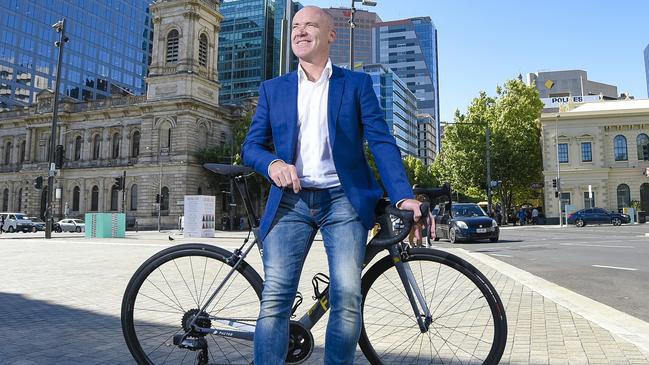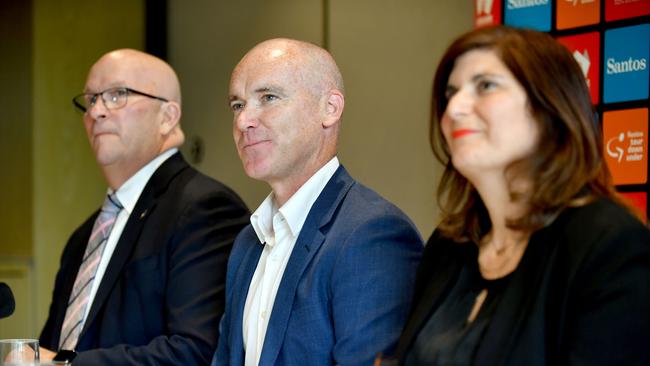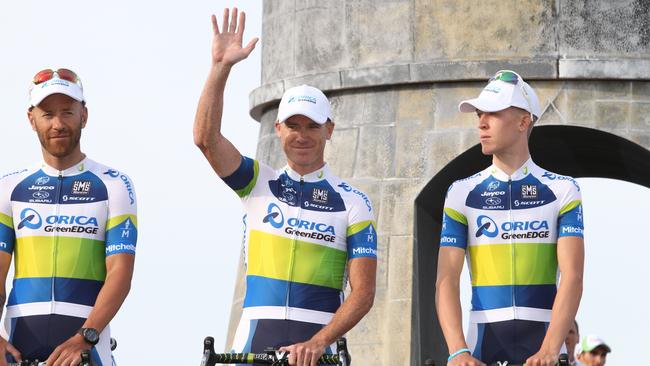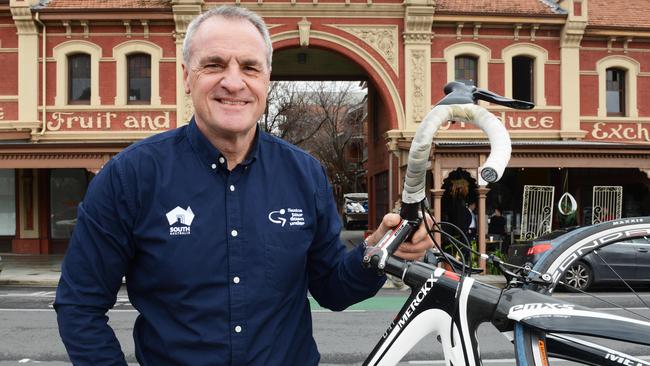Stuart O’Grady’s TDU appointment has divided opinion, but it’s time we forgive him for past transgressions
Stuart O’Grady made a terrible error by participating in doping almost 20 years ago. But that shouldn’t stop him from succeeding Mike Turtur as the Tour Down Under race director, writes Graham Cornes.

Tour Down Under
Don't miss out on the headlines from Tour Down Under. Followed categories will be added to My News.
- O’Grady appointed as TDU race director
- How to get the most out of your Advertiser digital subscription
Some crimes are unforgivable.
How can you forgive someone who wilfully takes a life?
Could you forgive someone who abuses your child?
Those who prey on the generosity or naivety of society’s more vulnerable victims and leave them destitute deserve nothing but our contempt.
Given the recidivism of such perpetrators, forgiveness would be wasted on them.
They never learn and to some the act of forgiveness is seen only as further encouragement – a green light to continue their despicable behaviour.
Yet forgiveness is one of our most powerful human emotions.
It can be defined as a “conscious, deliberate decision to release feelings of resentment or vengeance toward a person or group who has harmed you”.
In this increasingly un-Christian world, it is still a most Christian trait.

However, it’s an increasingly digital world, where abuse and criticism can be hurled from behind the cover of anonymity and forgiveness to our public figures seems superfluous and outdated.
“Maintaining the rage” may be justified in some cases, but not all.
Stuart O’Grady is worthy of our forgiveness.
The outcry since he was named as Mike Turtur’s successor as the Tour Down Under race director has been strident.
It seems that some are hesitant to forgive him his trespasses.
The Advertiser’s Michael McGuire was strong in his condemnation of the appointment.
David Washington, in the independent press, was similarly critical.
Social media, if you can trust it, has presented divided opinion.
Fair enough, but at least McGuire and Washington have put their names to the criticisms and reminded us, forced us even, to consider the worthiness of the appointment.
MORE NEWS
Why O’Grady’s appointment sends wrong message
New hope: O’Grady the right choice for TDU
O’Grady destined to win TDU’s top job
O’Grady admitted to experimenting with the blood-doping agent EPO, which is banned under sport’s strict anti-doping regulations.
We were disappointed, but were we shocked? Probably not.
Most sports are defined by the culture within.
The behaviour of athletes within those sports is generally dictated by the culture of the team or the group.
This can be either good or bad.
Young athletes coming into a group will look to their leaders to set the example.
They definitely look to the best of the competition to see what they need to do to compete.

Very few sports have been able to escape the scourge of experimentation with performance enhancing drugs, but cycling was one of the worst.
Imagine the predicament of a young cyclist joining a team - the fulfilment of all his childhood dreams - and being confronted with the reality that his heroes, his teammates and his competitors are using EPO (a naturally occurring substance) to boost their performances.
The practice is so common that indulging seems justified.
The frustration that he can never compete against those odds is overwhelming.
In 1996, Graham O’Bree, the 1993 world champion in the individual pursuit, told L’Equipe magazine: “In my opinion, 99 per cent of riders at elite level take EPO or a similar drug, not particularly to dope themselves, but to be at the same level as the others. And that’s rather sad.”
He added that; “I was signed up to ride in the prologue of the Tour back in 1995, but it was made very obvious to me I would have to take drugs. I said ‘no, no way’ and I was sacked by the team.”
Such individual strength of character is admirable, but how many of us would be so honourable when our careers are jeopardised?
O’Grady’s foremost mentor and coach was the legendary Charlie Walsh, a fierce anti-drugs campaigner who had to contend with teams from competing countries using performance enhancing drugs.
He also had to withstand the pressure from Australian cycling officials to select cyclists who had already tested positive to performing enhancing drugs.
He developed a cynicism for the claims that some athletes made about their use of performance enhancing drugs.

“What I did learn in time from observing cycling and other codes was that not all that an athlete will say, is true!”
He was bitterly disappointed in O’Grady’s revelations.
“Disappointed but understanding”, Walsh said yesterday.
Indeed one of the reasons O’Grady just couldn’t sustain a systematic EPO program was because he “couldn’t look Charlie in the face”.
Walsh speaks of another of his riders who did not submit to doping, but told him quite frankly: “If I had my time again I would do it (take EPO)”.
The difference was money.
“An elite cyclist went from labouring on $40,000 per annum to $750,000,” he said.
Who wouldn’t have succumbed when it was so ingrained in the culture?
We’ve all seen the power of both a negative and positive culture in our footy clubs.
The destructive negativity of accepted behaviour, be it gambling, drinking or lack of respect for women is in stark contrast to the new-age culture of respect, responsibility and inclusion that is so obvious in successful clubs.
Mike Turtur’s success as race director of a Tour that has become world-renowned was predicated on his record as an Olympic gold medallist, his relationships with world renowned cyclists and their teams, his dogged belief in our state, his vision and his networking skills. Stuart O’Grady shares those characteristics.

However, the critics bemuse me.
When do we stop paying for our transgressions, which in this case is minor compared to the endemic, systematic cheating of established cycling teams (and countries)?
Who of us haven’t transgressed society’s laws and mores in some form or other?
Who of O’Grady’s critics haven’t ingested or inhaled an illicit substance?
Who of them haven’t driven when they should not have?
Who of them haven’t broken the law in some respect?
Would they not expect forgiveness if exposed?
O’Grady broke the rules.
He confessed, be it from a sense of righteousness, a lingering guilt or a fear of exposure.
The admission was genuine and heartfelt.
He has served a necessary period of redemption.
It was a victimless “crime”.
Why is he not worthy of our forgiveness?
Originally published as Stuart O’Grady’s TDU appointment has divided opinion, but it’s time we forgive him for past transgressions
